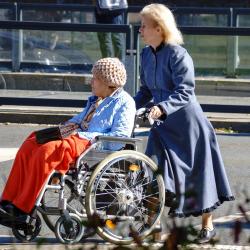The Importance of Emotional Support for Elderly Relatives
The significance of providing emotional support to elderly relatives has become increasingly vital. As people grow older, they often face a myriad of challenges, including health issues, loss of independence, and the passing of peers, which can lead to feelings of isolation and loneliness. Offering emotional support is not only a humane response to these challenges but also plays a critical role in enhancing the quality of life for the elderly.
Understanding Emotional Needs
Elderly individuals, like everyone else, require emotional connections to thrive. Emotional support encompasses a range of actions and attitudes, including empathy, companionship, active listening, and understanding. These elements are crucial in helping the elderly navigate the emotional turbulence that often accompanies aging.
As physical capabilities decline, many elderly people experience a loss of independence, which can lead to frustration and depression. By offering emotional support, family members can help mitigate these feelings, promoting a sense of worth and belonging. Engaging in regular conversations, showing interest in their experiences and stories, and involving them in family decisions can make a significant difference in their emotional well-being.
Combatting Loneliness and Isolation
Loneliness and isolation are significant issues among the elderly, often exacerbated by the passing of friends and spouses, reduced mobility, and limited social interactions. These feelings can have serious repercussions on both mental and physical health. Studies have shown that loneliness is linked to increased risks of depression, anxiety, cognitive decline, and even cardiovascular issues.
Family members can play a pivotal role in alleviating these feelings by ensuring regular contact and engagement. Simple gestures, such as a phone call, a video chat, or a visit, can brighten an elderly relative's day. Encouraging participation in community activities or senior groups can also provide opportunities for socialization and new friendships.
Enhancing Quality of Life
Providing emotional support can significantly enhance the quality of life for elderly relatives. When seniors feel valued and connected, they are more likely to maintain a positive outlook on life and engage in activities that promote mental and physical health. Emotional support can empower them to pursue hobbies, volunteer work, or educational pursuits, fostering a sense of purpose and fulfillment.
Moreover, emotional support can facilitate better health outcomes. Elderly individuals who have strong emotional support networks tend to adhere more closely to medical advice, show improved recovery rates from illnesses, and have a better overall sense of well-being.
Building Strong Intergenerational Bonds
Offering emotional support to elderly relatives not only benefits them but also strengthens family bonds. Intergenerational relationships provide younger family members with a unique perspective on life, history, and resilience. These connections can teach empathy, patience, and the importance of caring for others, fostering a family culture of support and understanding.
Conclusion
In conclusion, the emotional support of elderly relatives is a crucial aspect of caregiving that should not be overlooked. By addressing the emotional needs of the elderly, we can improve their quality of life, combat loneliness, and create a supportive family environment. As society continues to age, it is imperative that we recognize and prioritize the emotional well-being of our elderly loved ones, ensuring they feel valued, respected, and connected in their later years.






















